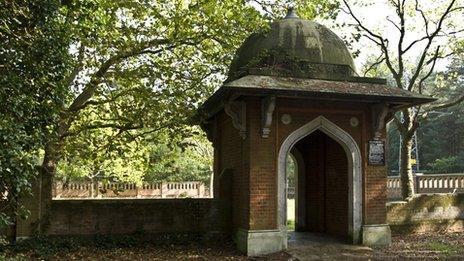Brookwood graves: 'Forgotten' fallen of world wars remembered
- Published
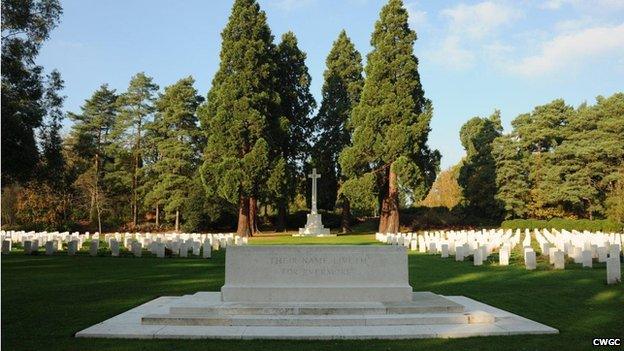
Brookwood Military Cemetery in Surrey has two Crosses of Sacrifice, and two Stones of Remembrance which bear the inscription: "Their name liveth for evermore"
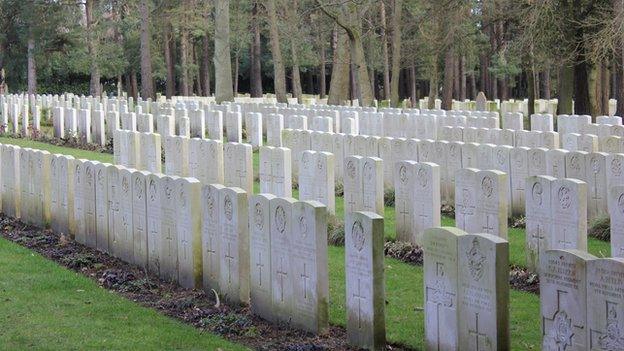
As well as Commonwealth plots, there are French, Polish, Czech, Belgian, Italian and American graves
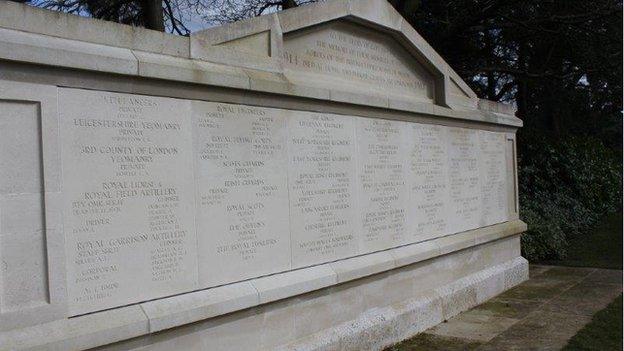
The 1914-1918 memorial commemorates about 500 Commonwealth casualties who died in the UK during WWI but for whom no grave could be located
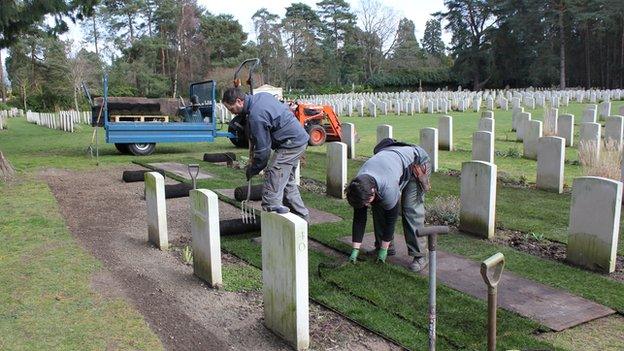
Keeping the cemetery tidy is a full-time job - gardeners Rebecca Dowling and Tim Bowen "close in" the borders around the headstones back to the recommended width of 45cm (17ins)
Hundreds of thousands of people annually flock to France and Belgium to see the battlefields, war graves, memorials and last resting places of the servicemen and women who fell during the two world wars.
As the 100th anniversary of the outbreak of World War One and the 75th of the start of World War Two approach, what is being done to encourage visitors to remember those buried on home soil?
Brookwood Military Cemetery, near Woking in Surrey, is just 30 miles (48km) from London and the largest Commonwealth war cemetery in the UK.
Giant redwoods are among the hundreds of trees adorning the almost-rural 37-acre site, notable for its peacefulness and tranquillity.
The cemetery contains 1,601 Commonwealth burials of WW1 and 3,476 from WW2, of which five are unidentified - and they are among 170,000 WW1 graves to be found at 13,000 burial sites in the UK - most of which have very few visitors.
"Chances are there's a piece of First World War commemorative history on your doorstep, and you don't need to go to France or Belgium," says Peter Francis, of the Commonwealth War Graves Commission (CWGC).
"You can put a human face to the cost of the First World War, and put it into its wider geographical context too."
Another 3,438 men and women from the land forces who died during WW2 but have no known grave are commemorated on the Brookwood Memorial - their names carved on panels of green slate.
The 1914-1918 memorial commemorates about 500 Commonwealth casualties who died in the UK during WWI without a grave.
'History on doorstep'
Brookwood was established in 1917 to meet the need for war casualties who died in UK hospitals - it was then extended for the burial of WW2 casualties.
As with all military cemeteries, the distinctive white headstones marking the final resting place of the war dead are arranged in straight rows, to signify soldiers on parade.
The youngest soldier buried there is Thomas Andrew Knowles, who died of influenza in 1918 at the age of 15.
Soldiers who have died in more recent conflicts have also been laid to rest at Brookwood, including Warrant Officer Darren Chant, from the 1st Battalion the Grenadier Guards, who lived in Camberley and was killed in Afghanistan in 2009.
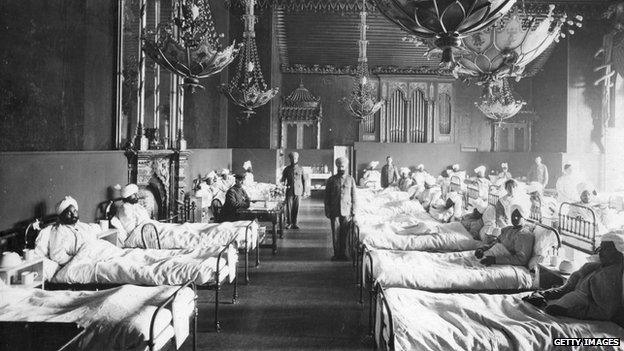
Muslim Indian soldiers who died during WWI while in the Indian military hospital at Brighton's Royal Pavilion are buried at Brookwood in accordance with Islamic tradition
Mark Creber, head gardener, estimates that about 5,000 people visit Brookwood each year, compared to more than 300,000 visitors to Tyne Cot, near the Belgian city of Ypres - the largest of the WWI British cemeteries, containing the bodies of 11,000 men.
'Worn out turf'
"A lot of people in Britain don't actually realise that places like Brookwood exist, probably because of the very high profile of cemeteries abroad," he said.
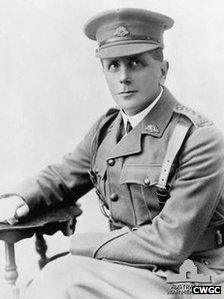
Capt Ronald Henderson, of the Australian Army Medical Corps, was buried in 1917
"I think a lot of it is just a lack of exposure to that information... people don't know."
He conceded there would be more visitors if Brookwood had been a battlefield site, which was undoubtedly "a bit of a draw" for people choosing to go abroad.
Local schools have visited the graves, including pupils from Brookwood Primary School, who visited the cemetery last year in a trip described by head teacher Jo Green as "one of the best things we did".
She said pupils explored the site and looked for the youngest and oldest war dead, becoming "very quiet and reflective as the reality of the situation hit home".
The CWGC recognises more needs to be done to promote its cemeteries in the UK, particularly as WW1 is at least "three generations removed" for many people.
It has been erecting signs and writing to MPs in an effort to attract more local interest, particularly from the younger generation.
'Remember the fallen'
It is also piloting a "learning outside the classroom" resource and a smartphone app, with visitor information panels installed that carry interactive recognition codes.
"These men and women served their country, they sacrificed their lives for the country, and they deserve to be visited, and deserve to be remembered," Mr Francis said.
He added sites such as Tyne Cot had taken "a bit of a pounding from all those pairs of feet".
"We've put turf reinforcement systems in... it would be a nice problem for us to have here at Brookwood as well," he said.
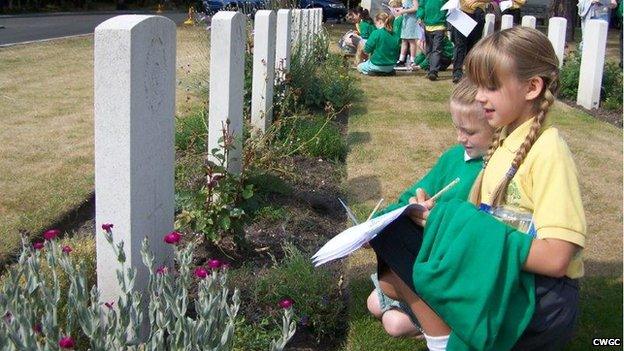
Pupils from Brookwood Primary School visited the cemetery last year
"We want you to come and walk on the grass, visit the graves, remember the fallen."
Mr Francis added: "The centenary is an opportunity for us and we're pushing at an open door."
- Published3 March 2014
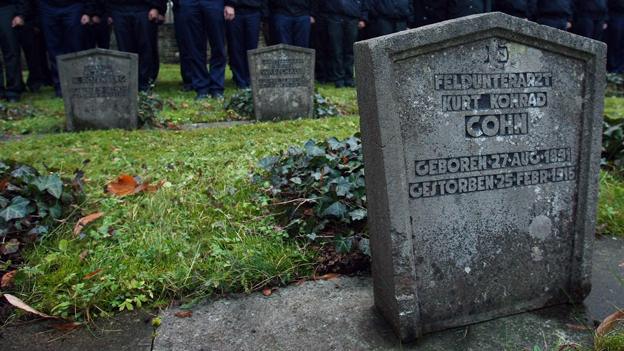
- Published24 February 2014
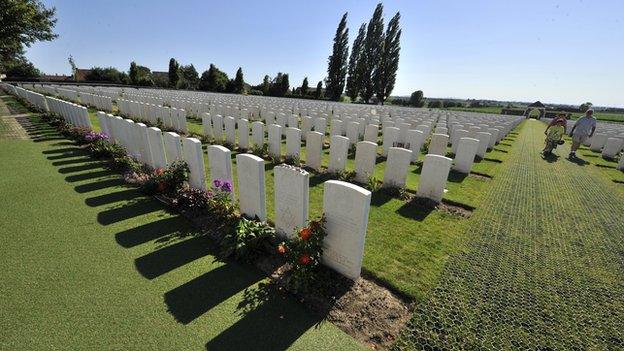
- Published30 August 2013
